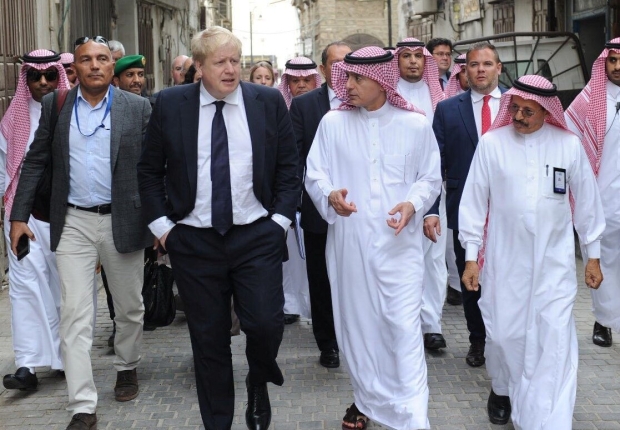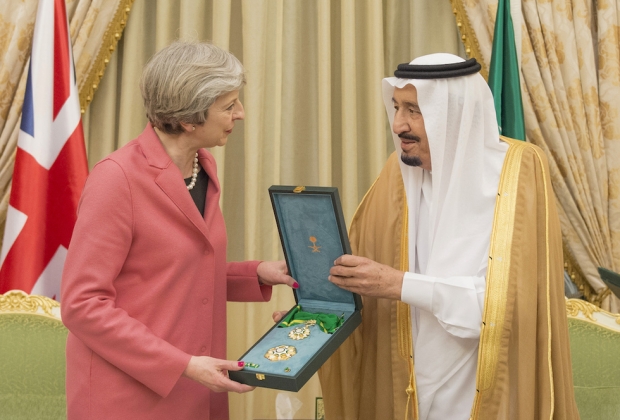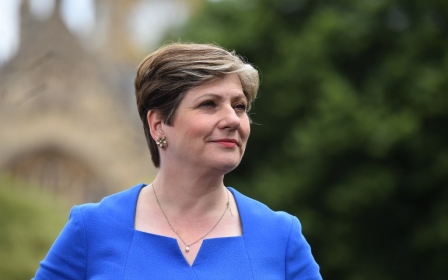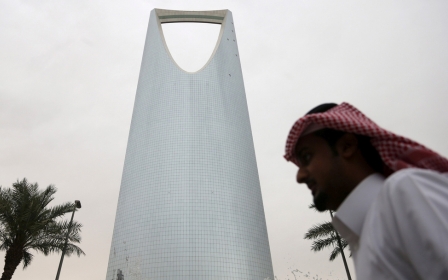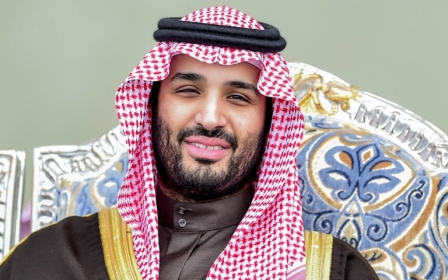Theresa May and the crown prince: Beware Saudi authoritarianism in liberal disguise
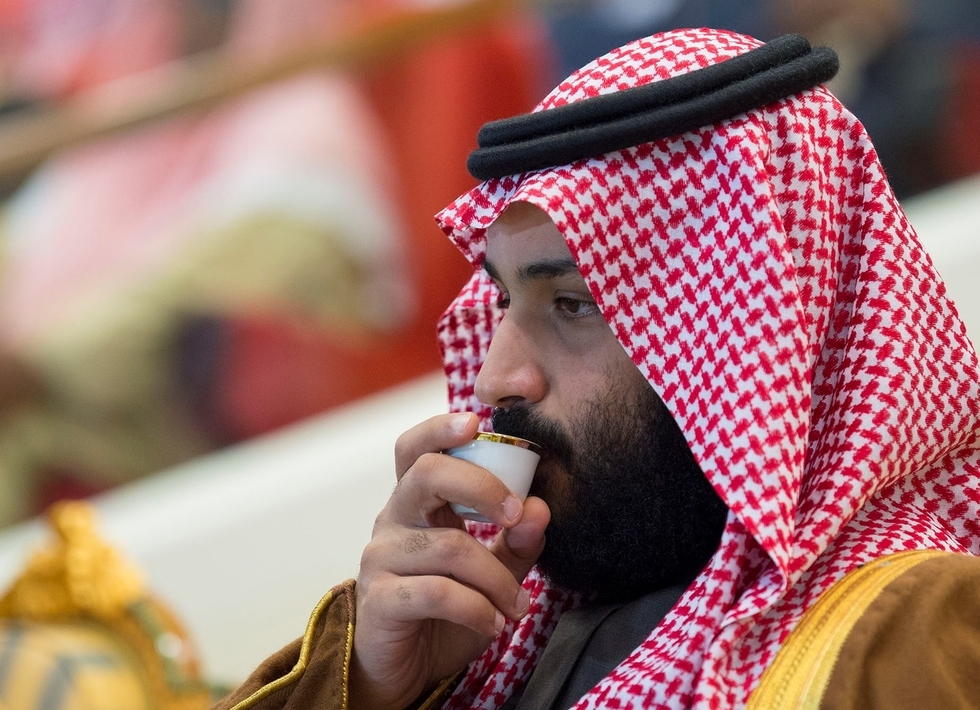
The controversy surrounding Saudi Crown Prince Mohammed bin Salman's visit to Downing Street this spring is symptomatic of the rift between a British public eager to maintain a moral foreign policy and successive British governments ignoring loud critical voices.
With the exception of the Liberal Democrats, both main political parties have always cherished close relations with the most autocratic leaders in the Arab world (although that appears to have changed under Labour leader Jeremy Corbyn, who has called for an end to arms sales to Saudi Arabia).
Recently, with a shaky economy and a deep nostalgia for empire that has yet to vanish among the governing elite, Prime Minister Theresa May announced plans to welcome the crown prince amidst loud protest from a wide range of British civil society groups.
She probably hopes the initial public offering of 5 percent of the Saudi oil company Aramco will take place in London. Should this happen this year, it will create a bonanza for financial and service institutions, above all banks, consultants and lawyers.
Neither ideology nor values
As a rule of thumb, with few exceptions, almost all controversial authoritarian rulers have been welcome in London. British foreign policy rests on neither ideology nor values. Common British wisdom tells us that engaging the dictators is better and more productive than shunning them.
After all one cannot expect British governments to boycott all dictators as they won't have any leaders to talk to, especially in the Arab world. For several reasons, the British government, however, should not continue to ignore the loud critical voices when it rolls out the red carpet for the crown prince's visit.
First, Britain provides Saudi Arabia with a whole range of jetfighters, surveillance technology and military training, all having been deployed in destabilising the Arab world under the leadership of Mohammed bin Salman.
One cannot expect successive British governments to boycott all dictators as the government won’t have any leaders to talk to, especially in the Arab world
In the Arabian Peninsula, Saudi military interventions have suffocated a pro-democracy movement in Bahrain and totally destroyed another poor country, Yemen.
In the ex-British colony of Bahrain, now a Saudi satellite state, the local monarch, Hamad bin Isa Al-Khalifa, can only rule by detention and repression. Direct Saudi intervention since 2011 succeeded in creating a volatile island on the verge of implosion.
In Yemen, Saudi air strikes since 2015 contributed to a serious humanitarian crisis. Under Saudi-UAE military intervention, Yemen is now even more fragmented and divided, with separatist movements in the north and south getting stronger, al-Qaeda affiliates operating under the nose of the intervening regional powers, and new unruly militia forming everywhere.
Just recently one such separatist movement supported by the UAE, the other Saudi partner in this war, raided Aden, the temporary capital of exiled Yemeni President Abd Rabbuh Mansour Hadi, further eroding the authority of this government that now exists only on paper.
While British manufactured weapons are not the only ones that the Saudis use, Britain provides a large number of the jetfighters that are deployed in Yemen. Can Britain be held responsible for selling the very tools that have destroyed one of the poorest Arab countries?
So far, it seems not. Under pressure from several anti-war and anti-armaments NGOs, a British court absolved Britain from any wrong doing. However, the controversy continues and will inevitably lead to massive protest when the prince arrives in London next month.
A new Saudi authoritarianism
Second, the British government should be wary of the new Saudi authoritarianism in liberal disguise. Allowing women to drive, promoting dancing in the streets, curbing the powers of the infamous religious police all sound good and promising. Yet, Mohammed Bin Salman is not a religious, economic, or political reformer.
The crown prince's embrace of moderate Islam conceals a nasty agenda that has so far resulted in the incarceration of hundreds of innocent people dubbed as radical, Islamists, or simply critical of his glamorous plans to break from the past and transform Saudi Arabia.
By unequivocally supporting a regimes like the Saudi one, Britain loses the moral high ground
Economically, the prince is often painted as a neoliberal crusader, a believer in free trade and a worshipper of the market, who promises to revolutionise a state capitalist economy still dependent on oil, and riddled with corruption and favouritism.
But in truth, he is a populist, ready to play the xenophobic nationalist card to secure popularity among the disenfranchised and unemployed youth. History suggests that appeasing such forces comes at a high price.
The guise of fighting corruption
His latest anti-corruption campaign was planned to purge rivals and illegally appropriate funds from wealthy crony entrepreneurs such as Alwaleed bin Talal, Saleh Kamel and Waleed Al-Ibrahim among others. The Ritz Carlton detainees amassed wealth over several decades simply because they were so close to previous kings. They were connected and as such they were the financial ancien regime.
Under the guise of fighting corruption, Mohammed Bin Salman found the ideal and quick recipe to fill his coffers. Detaining old wealth and nouveaux riches in the Ritz Carlton for several months, while negotiating secret deals, then releasing several - but not all - detainees was an unusual strategy to say the least.
Certainly this is not the way to fight corruption, reassure foreign investors, or initiate long-lasting economic reforms. It is a purge, a daring coup by someone who now has all power in his hand and with no checks - moral, legal or even religious.
But why should the British government worry about such devious methods of confiscating wealth, eliminating rivals and exercising power? Shouldn't this be a purely Saudi domestic issue?
Well, the problem is not only a Saudi one. A recent BBC documentary revealed the degree to which British officials and personalities are implicated in the Saudi corruption scandals. For many British viewers, it was not shocking to learn that Saudi royals are corrupt. They were shocked as they learned how successive British governments are implicated in the corruption of those princes.
In Britain, a democratic government, a transparent political culture, and a pervasive rule of law have all failed to expose the degree to which the British establishment is implicated in dodgy deals with the Saudi regime in which bribes are common. The documentary revealed how far British officials are prepared to go to protect Saudi royals from the rule of law.
The most recent case was former prime minister Tony Blair's decision to halt the special investigation in the infamous Al-Yamama arm deal in 2008. In 2013, a quick agreement between Britain and Saudi Arabia to exchange prisoners signed immediately after a prince murdered his slave servant in a London hotel resulted in the prince being put on a plane and sent to Riyadh to serve a life sentence, perhaps in the comfort of a secret villa.
Covering up Saudi scandals
British officials may have succeeded in concealing their role in covering up Saudi scandals but for how long can they maintain their silence? No doubt the expected visit of the Saudi crown prince will open new files and inquires. British civil society is determined not to let the event pass without scoring goals against a government that has paid lip service to values it claims to cherish.
By unequivocally supporting a regimes like the Saudi one, Britain loses the moral high ground. Why should anyone listen when British politicians flaunt their so-called values in the context of new immigrants? The latter would not miss the hypocrisy and complicity of the British government. Our so-called British values have becomes a cliche.
In fact many immigrants and refugees have fled their countries because the British government and other Western countries have continuously supported the autocrats whose violence, oppression and corruption resulted in the flood of refugees and asylum-seekers that all of Europe, above all Britain, complains about.
Mohammed bin Salman's repression is already generating a new wave of dissidents seeking exile. This included a number of activists, religious minorities, princesses and students who have applied for asylum in Britain. Saudis who have recently fled the repression of bin Salman now join old Saudi dissidents who arrived in London in the 1990s.
A new wave of so-called Saudi women runaways apply for asylum on the basis of being oppressed, forced into unwanted marriages, or prevented from living their life as they choose, all under the nose of Mohammed Bin Salman and his reformist agenda. If the state cannot protect abused women, who can?
Should all the critical voices raised over the royal visit come together in a massive demonstration and disrupt the pomp, it would be rather difficult for Prime Minister Theresa May to convince her audiences that there are merits in engaging and endearing autocrats.
Perhaps she should make at least some noise about the merit of a transparent Saudi political system and the rule of law before signing future lucrative deals with Saudi Arabia. She should at least reread George Orwell's Shooting an Elephant to understand that when a white woman endears tyrants, it is her freedom that she destroys.
- Professor Madawi al-Rasheed is a visiting professor at the Middle East Centre at the London School of Economics. She has written extensively about the Arabian Peninsula, Arab migration, globalisation, religious transnationalism and gender. On Twitter: @MadawiDr
The views expressed in this article belong to the author and do not necessarily reflect the editorial policy of Middle East Eye.
Photo: Saudi Arabia's Crown Prince Mohammed Bin Salman drinks coffee during the Annual Horse Race ceremony, in Riyadh, Saudi Arabia, 30 December 2017 (Reuters)
Middle East Eye propose une couverture et une analyse indépendantes et incomparables du Moyen-Orient, de l’Afrique du Nord et d’autres régions du monde. Pour en savoir plus sur la reprise de ce contenu et les frais qui s’appliquent, veuillez remplir ce formulaire [en anglais]. Pour en savoir plus sur MEE, cliquez ici [en anglais].



